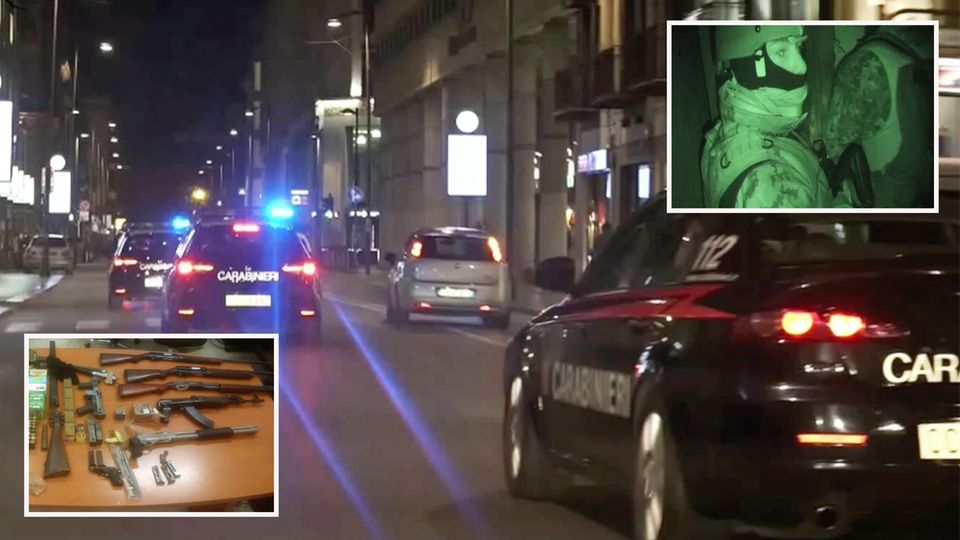Mafia organization
Blackmail, murder, drug trafficking: How the ‘Ndrangheta makes money
A trial is underway in Italy against 350 suspected ‘Ndrangheta members
The ‘Ndrangheta became widely known in the 1980s and 90s through a series of kidnappings throughout Italy. How the mafia organization makes its money and still differs from others.
In Italy, a court in Calabria handed down prison sentences of many hundreds of years in the largest mafia trial in more than three decades (Here you can read more about it). The XXL trial in Lamezia Terme was directed against the Calabrian ‘Ndrangheta, Italy’s most powerful mafia organization, which does not shy away from blackmail or murder and is behind drug trafficking, money laundering and illegal waste disposal. An overview:
Where are the origins of the ‘Ndrangheta?
The name of the ‘Ndrangheta is said to come from Greek. The Greek word “andranghateia” stands for a group of “men of honor”, the word “andrangatho” for military fighting.
The roots of the group, which has only been officially classified as a mafia organization in Italy since 2010, go back to the founding of the Italian nation-state in 1861.
The ‘Ndrangheta became widely known in the 1980s and 90s through a series of kidnappings throughout Italy. The kidnapping of a grandson of US oil billionaire John Paul Getty in the 1970s is also said to be the responsibility of the ‘Ndrangheta. Over the years, the ‘Ndrangheta has developed into the most powerful and richest mafia organization in Italy – ahead of the Sicilian Cosa Nostra and the Neapolitan Camorra.
What are their fields of activity?
Judge Roberto Di Bella, who has been dealing with the Calabrian mafia for around three decades, once called the ‘Ndrangheta “perhaps the most powerful criminal organization in the world.” But it is certainly the most widespread – on all five continents. Their areas of activity include drug trafficking, extortion, money laundering and illegal waste disposal.
The more than a thousand witnesses in the trial in Lamezia Terme described, among other things, ambush attacks, blackmail of business owners, manipulation of public tenders, vote buying and bribery of people in positions of power.
Cosa Nostra
30 years ago today, the Sicilian mafia murdered its greatest enemy – and thereby sealed its own downfall
The ‘Ndrangheta relies – more than other mafia organizations – on family structures and blood relationships. According to Di Bella, this structure ensures strong cohesion “because there are only a few breakaways.” The resulting reliability makes the ‘Ndrangheta a popular business partner for Colombian or Mexican cartels who work with them in drug trafficking in Europe.
What do structures and assets look like?
The Italian authorities estimate that the ‘Ndrangheta consists of around 150 clans and their supporters and has at least 20,000 members worldwide. Anti-Mafia prosecutor Nicola Gratteri assumes the ‘Ndrangheta’s global annual turnover is more than 50 billion euros. A large part of it comes from the cocaine trade. The ‘Ndrangheta launders the profits from illegal activities with investments in the legal economy.
In Calabria, the mafia organization has infiltrated almost all areas of public life, from city administrations to hospitals to the courts.
Prosecutor Gratteri, who has been under police protection for his investigations for more than 30 years, said at the opening of the maxi trial in Lamezia Terme in January 2021 that the ‘Ndrangheta is “no longer a mafia of shepherds who specialize in kidnapping “but a large criminal enterprise”.
Is the ‘Ndrangheta also active in Germany?
The fight against the ‘Ndrangheta also concerns the German police. In May she took part in a major Europe-wide raid against the Calabrian mafia. After Italy, Germany was the country with the second most of the 132 arrests. Investigators in several federal states searched residential and business premises in numerous locations and executed more than 30 arrest warrants.

In June, Europol reported another major international operation against the ‘Ndrangheta with a total of 31 arrests, five of them in Germany. They are said to have set up a network to smuggle cocaine mainly from South America to Germany and Italy via several European ports. To this end, according to Europol, the group had “set up companies in Germany to facilitate drug smuggling.”
The ‘Ndrangheta had already made headlines in Germany in August 2007. At that time, six men between the ages of 16 and 39 were shot in front of the Italian restaurant “Da Bruno” in Duisburg; the perpetrators executed their victims with 54 shots. According to the investigators’ findings, the murder of six people was the bloody climax of a years-long feud between rival clans of the ‘Ndrangheta from the Calabrian town of San Luca.

